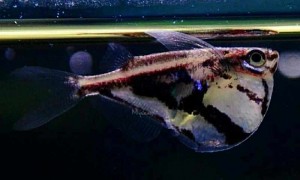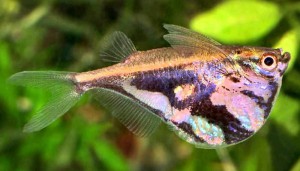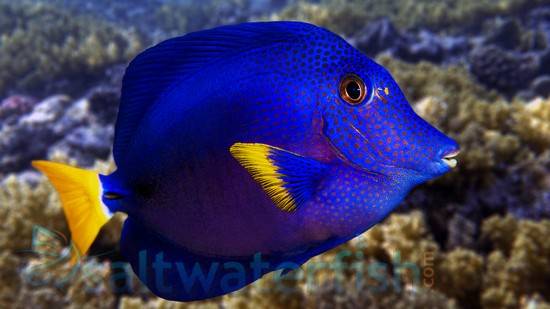Marbled Hatchetfish (Carnegiella strigata) have an enormous range that extends throughout Amazonian Bolivia, Brazil, Peru, Columbia, the Río Orinoco system in Venezuela, and some coastal drainages in Guyana and Suriname.
Marbled Hatchetfish are exclusive to acidic blackwater environments characterized by thick, overhanging vegetation and substrates covered with fallen branches, tree roots, and various types of leaf litter. They seem to thrive in the tannin stained brownish colored water littered with decomposing organic matter.
The Marbled Hatchetfish is easily distinguished from other members of the genus by its larger adult size and it’s dark, marbled color pattern that appears as a series of dark and light stripes running diagonally across the body directly below the lateral line. Adult females are rounder bodied and slightly larger than males.
Their color patterns are variable and different populations are known to exhibit differences in body depth and the number of anal fin rays which led to the description of several subspecies.
Carnegiella strigata fasciata was described from Tabatinga, Brazil, near the ‘Três Fronteiras’ where the borders of Brazil, Peru and Colombia meet, Carnegiella strigata vesca from the Mazarumi River, Guyana, Carnegiella strigata marowini from the Marowini River, Suriname and Carnegiella strigata surinamensis from an unnamed swamp in northern Suriname.
These subspecies were described as ‘forms’ and recognized as being two distinct species; Carnegiella strigata strigata with an essentially ‘V’-shaped color pattern found in Guyana, Suriname and parts of the Amazon, and Carnegiella strigata fasciata with a ‘Y’-shaped color pattern found throughout the Amazon. Other color forms exist in the Rios Negro and Orinoco.
Marbled Hatchetfish are very peaceful but because of their small size and timid nature do not make good candidates for a community tank. If they must be kept in a community environment, at least 10 or more should be housed together along with similarly sized tetras, peaceful characids and smaller sized loricariid or callichthyid catfish. When kept in larger groups they tend to become bolder and exhibit more of their natural behavior.
Ideally, Marbled Hatchetfish should be kept in a densely planted tank with a dark substrate of sand or fine gravel, some floating plants
for the fish to congregate, and lots of surface area. Dried leaf litter and driftwood branches can be added to provide the colonies of microbes that seem to be beneficial to the fry and adults. A small power head should also be provided for some water movement.
The Marbled Hatchetfish is the easiest to breed if you can identify a breeding pair. There is no difference between sexes except when females become gravid with eggs. If you can identify a pair, separate them to a quiet, sheltered, breeding tank with soft, acidic water and plenty of floating vegetation.
After the eggs are laid among the floating plants, remove the parents or the eggs will be eaten.
Feed the fry infusoria or liquid food for a few days until they are able to accept newly hatched baby brine
shrimp, rotifers, or finely crushed flake food.
The Marbled Hatchetfish is a predator that feeds on aquatic and terrestrial insects, invertebrates, and other zooplankton in their natural habitat. In an aquarium environment, they will accept small dried floating foods but prefer regular meals of live or frozen daphnia, Monia, brine shrimp, bloodworms, mosquito larvae, baby crickets or Drosophila fruit flies
.
Marbled Hatchetfish are common in the aquarium hobby and are usually available for sale when they reach 3/4″ to 1 1/4″ in size.
Minimum Tank Size: 20 gallons
Care Level: Moderate
Temperament: Peaceful
Water Conditions: 75-81° F, KH 10-18, pH 5.5-7.5
Max. Size: 2”
Color Form: Green, Orange, Red, Tan
Diet: Carnivore
Compatibility: Excellent in peaceful community tanks
Origin: South America
Family: Gasteropelecidae
Lifespan: 2-5 years
Aquarist Experience Level: Advanced




